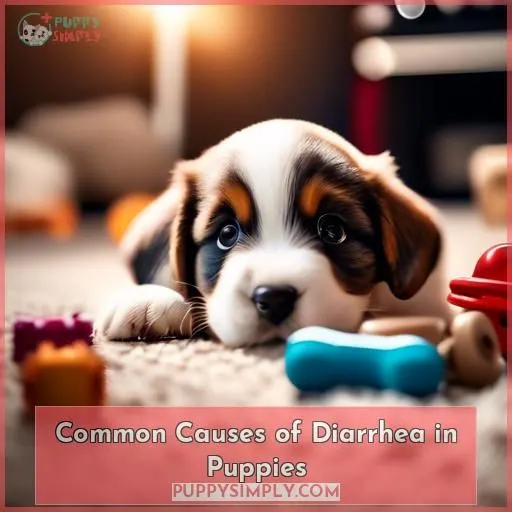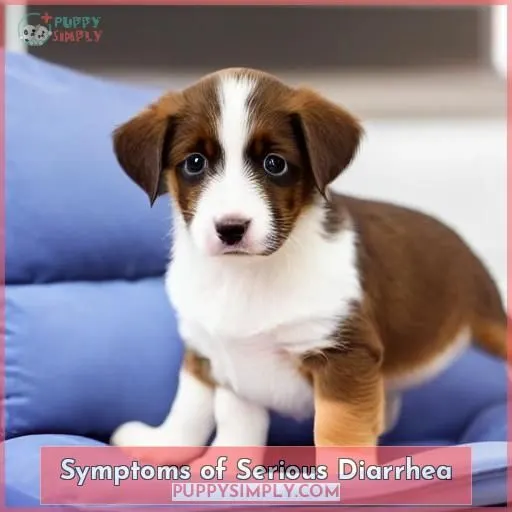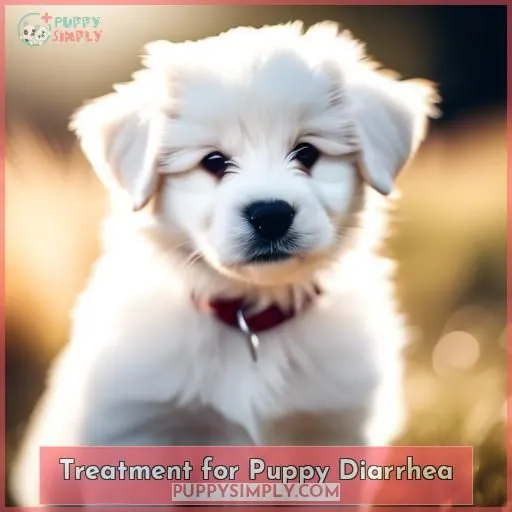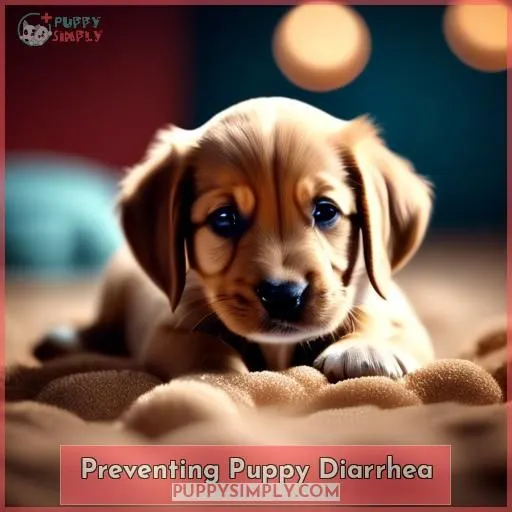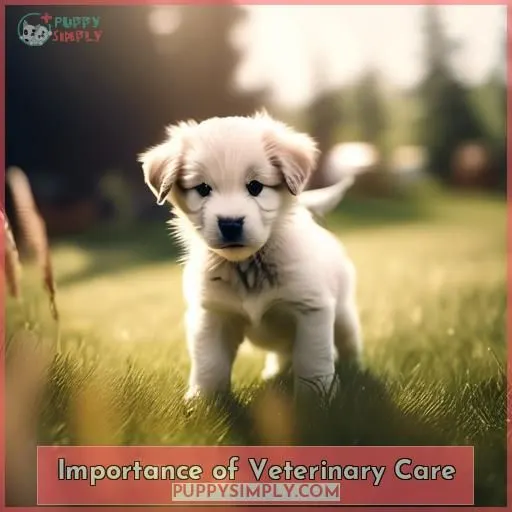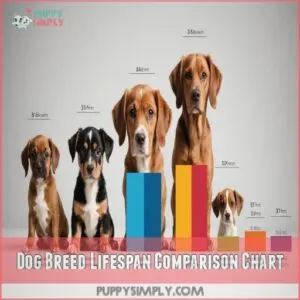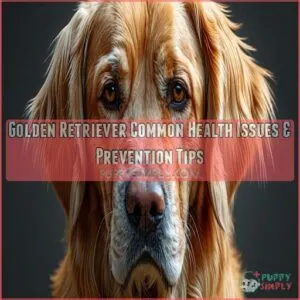This site is supported by our readers. We may earn a commission, at no cost to you, if you purchase through links.

Don’t worry, it’s not unusual for a puppy to have diarrhea but still be playful. Puppies are resilient!
Likely causes are diet changes, infections, or parasites.
Monitor for serious symptoms like bloody or black stools, fever, vomiting, or lethargy.
If those develop, call your vet immediately as diarrhea can quickly dehydrate puppies.
Otherwise, try bland food, probiotics, and smaller portions.
Keep your pup hydrated and comfortable.
With some simple home care, that playful energy should return soon, but you’ll want to learn what steps to take next.
Table Of Contents
Key Takeaways
- Monitor for serious symptoms like bloody or black stools, fever, vomiting, or lethargy.
- Keep your puppy hydrated and comfortable with a bland diet, probiotics, and smaller portions.
- Common causes of puppy diarrhea include dietary changes, infections, parasites, or antibiotic use.
- Prevent diarrhea by gradually introducing new foods, avoiding table scraps, and following a regular deworming schedule.
Common Causes of Diarrhea in Puppies
Diarrhea in puppies is a common concern, and it’s important to identify the underlying cause. While it can be caused by dietary changes, overexertion, infections, parasites, or allergies, if your puppy is still playful and active, there’s a good chance it’s not a serious issue.
Causes of Puppy Diarrhea
Your puppy’s diarrhea could be due to:
- Dietary indiscretion
- Viral or bacterial infections
- Intestinal parasites
- Antibiotic use
- Stress
To prevent diarrhea:
- Gradually introduce new foods
- Avoid table scraps
- Follow a regular deworming schedule
Keep your puppy:
- Crated
- Supervised
- Away from toxic plants and unvaccinated dogs
If your puppy’s diarrhea persists, consult your veterinarian for a proper diagnosis and treatment plan.
Symptoms of Puppy Diarrhea
If your puppy experiences diarrhea but maintains a playful demeanor, it’s imperative to monitor their condition closely.
Common causes of puppy diarrhea include stress, dietary adjustments, antibiotic administration, gut microbiome disruption, and intestinal parasites.
Symptoms may include bloody diarrhea, dark, tarry stools, elevated temperature, vomiting, and pale gums. If your puppy exhibits these symptoms, seeking immediate veterinary attention is paramount.
Dehydration and electrolyte imbalances can result in serious health complications.
Preventive measures include implementing dietary changes gradually, refraining from feeding table scraps, and adhering to a regular deworming schedule.
Treatment for Puppy Diarrhea
If your puppy is experiencing diarrhea, it’s essential to address the problem promptly to prevent complications. Begin with a bland diet, probiotic supplements, and hydration monitoring. If symptoms persist, your veterinarian may suggest medication like metronidazole, tylosin, or Endosorb. Remember, dehydration can lead to severe health issues, so keep an eye on your puppy’s electrolyte balance.
Symptoms of Serious Diarrhea
While playfulness is a good sign, you should take any instance of diarrhea seriously in puppies. Bloody diarrhea, black tarry stools, fever, vomiting, and pale gums are red flags that indicate your pup may be severely dehydrated or suffering from a serious condition like parvo or an intestinal obstruction.
Bloody Diarrhea
If your puppy exhibits bloody diarrhea, it’s imperative to seek veterinary assistance without delay.
This symptom may be indicative of a grave condition, such as parvovirus or other infections, which can result in perilous dehydration and harm to internal organs.
While awaiting the counsel of your veterinarian, you can offer your puppy a gentle diet, such as boiled chicken and rice, to alleviate their digestive distress.
Furthermore, make sure your puppy remains hydrated by providing access to water or electrolyte solutions.
Should your puppy experience vomiting as well, it’s vital to closely monitor their condition, as the combination of vomiting and diarrhea can lead to severe dehydration.
Black, Tarry Stools
Black, tarry stools in puppies can be a sign of serious health issues. This type of stool is caused by the presence of digested blood in the feces, which can indicate internal bleeding in the upper digestive system. Some common causes of black, tarry stools in puppies include intestinal parasites, bacterial or viral infections, gastrointestinal ulceration, and clotting disorders.
If your puppy is experiencing black, tarry stools, it’s essential to consult your veterinarian promptly. The vet may recommend diagnostic tests such as X-rays, blood tests, or fecal exams to determine the underlying cause of the black stool. Treatment may involve medications, fluid therapy, or even surgery in extreme cases.
To prevent black, tarry stools, make sure your puppy’s diet is fiber-rich, avoid feeding them table scraps, and practice good hygiene by picking up their poop immediately. Regular deworming and vaccination schedules can also help prevent parasitic infections and other health issues. Remember, black, tarry stools shouldn’t be ignored, as they can indicate serious digestive issues that require veterinary attention.
Fever
Fever in puppies can be a sign of various underlying issues, including dehydration, electrolyte imbalance, liver damage, kidney damage, and heart damage.
Dehydration can be caused by persistent vomiting and/or diarrhea, which can lead to a loss of electrolytes and further complications.
It’s essential to monitor your puppy’s temperature and overall health, as a fever can indicate a serious underlying condition.
If your puppy is experiencing a fever, it’s imperative to consult your veterinarian for proper assessment and treatment.
Vomiting
If your puppy is vomiting, it’s paramount to monitor them closely, as they’re vulnerable to dehydration and electrolyte imbalances. Vomiting can stem from various factors, such as consuming contaminated food, ingesting foreign objects, experiencing motion sickness, or even poisoning. In some instances, it may be indicative of a more severe condition like parvovirus or intestinal parasites.
Even if your puppy is vomiting but remains playful, it doesn’t necessarily imply that all is well. Vomiting can be a symptom of dehydration, which can lead to serious health complications if not promptly addressed. If your puppy is vomiting, it’s imperative to seek veterinary advice, as they may advise a bland diet, probiotics, or medication to alleviate the symptoms.
To prevent vomiting in puppies, implement dietary changes gradually, refrain from providing table scraps, and maintain a consistent deworming regimen. Keep your puppy contained and supervised to prevent them from ingesting harmful substances. Routine veterinary check-ups and vaccinations can also contribute to safeguarding your puppy from serious infections.
Pale Gums
When your pup’s gums go from pink to pale, it’s like a red flag waving in a sea of diarrhea troubles. Pale gums in puppies can scream dehydration louder than a howling wind. It’s a sign that their little bodies might be running on empty, and not just because they’ve been too busy playing. So, keep an eye out!
When to Call Your Vet
When your puppy experiences diarrhea, it’s essential to determine when to consult your veterinarian.
If your puppy is under 6 months of age, the risk of dehydration is heightened due to their diminutive size and underdeveloped immune system.
Signs such as bloody diarrhea, black, tarry stools, fever, and pale gums may suggest a parvovirus infection, which poses a significant concern for young puppies.
Stress, dietary missteps, and parasites can also contribute to diarrhea.
If your puppy’s diarrhea persists beyond a day or exhibits signs of dehydration, including excessive drooling, lethargy, or a dry nose, prompt veterinary attention is warranted.
Treatment for Puppy Diarrhea
If your puppy has diarrhea but is still acting playful, you can try some home remedies.
Give them a bland diet of boiled chicken and rice.
Add probiotics like yogurt or Yakult to help restore their gut flora.
However, if the diarrhea persists for more than a day or two, or is accompanied by other concerning symptoms like bloody stools, vomiting, or lethargy, it’s best to take your pup to the vet.
They may need medications like metronidazole, Tylosin, or Endosorb.
They may even need subcutaneous fluids to prevent dehydration.
Bland Diet
If your puppy is experiencing diarrhea, a bland diet can be a home remedy to help them feel better.
This means feeding them boiled chicken and rice, which is easy to digest and can help reduce inflammation in their gut.
Make sure to consult with your veterinarian before making any dietary changes.
They may recommend additional treatments like probiotics or medication if necessary.
Probiotics
If your puppy has diarrhea, probiotics can be a helpful addition to their treatment. Probiotics are beneficial bacteria that support gut health and the immune system. Here’s how you can incorporate probiotics into your puppy’s routine:
- Choose the right probiotic: Opt for a probiotic specifically designed for dogs.
- Consult your vet: Always consult your veterinarian before starting any new supplements.
- Follow the recommended dosage: Administer the probiotic as directed by your vet.
- Consistency is key: Continue administering the probiotic for the recommended duration.
Probiotics can help restore the balance of beneficial bacteria in your puppy’s gut, supporting their digestive health and immune system.
Medication (metronidazole, Tylosin, Endosorb)
If your puppy is experiencing diarrhea and you’re wondering about medication options, your veterinarian might recommend metronidazole, tylosin, or endosorb. Here’s a breakdown of these treatments:
- Metronidazole: This antibiotic is often the first choice for treating diarrhea in dogs. It works as an anti-inflammatory on the intestinal mucosa, helping to soothe inflammation regardless of the cause. The typical dosage for dogs is 5 to 10 mg/kg twice a day for five days, and it can be used to treat a variety of conditions, including inflammatory bowel disease, giardia, clostridial infections, and liver disease.
- Tylosin: This antibiotic is used to treat bacterial infections in dogs, including those causing diarrhea. It’s typically given at a dose of 10 to 15 mg/kg twice a day.
- Endosorb: This over-the-counter product is an absorbent anti-diarrheal for pets. It contains activated attapulgite, which absorbs fluid in the intestinal tract to stabilize stool consistency and soothe the gastrointestinal tract. It also contains citrus pectin, carob pulp, and magnesium trisilicate, which act as antacids to soothe the stomach.
Fluids Under the Skin
If your puppy is experiencing diarrhea and vomiting, it’s paramount to guarantee they remain hydrated. Subcutaneous fluids can be provided at home to assist in coping with moderate dehydration. These fluids are absorbed beneath the skin and can present a safer and more practical alternative to intravenous fluids. However, it’s imperative to recognize that subcutaneous fluids shouldn’t be utilized for pets that are markedly lethargic or experiencing severe dehydration, as they may not absorb the fluids competently.
To administer subcutaneous fluids, you’ll necessitate a sterile fluid solution, a syringe, and a 21-23 gauge needle. The fluid should be injected into a fatty region, such as the lower back or the area between the shoulder blades. It’s of the utmost importance to verify that the needle is inserted perpendicularly to the skin and that the fluid flows uninhibitedly. After injecting, gently massage the area to facilitate distribution of the fluid.
Subcutaneous fluids can be administered daily, every other day, or a few times weekly, contingent upon the underlying medical condition being addressed. It’s imperative to maintain a record detailing when fluids are given and the volume to guarantee appropriate administration.
Preventing Puppy Diarrhea
You can prevent puppy diarrhea by making dietary changes gradually, avoiding table scraps, following a regular deworming schedule, and promptly picking up dog poop. It’s also essential to keep your pup crated and supervised, keep human foods and toxic plants out of reach, follow the vaccination schedule, and avoid unvaccinated dogs.
Make Diet Changes Gradually
After tackling the tummy troubles with a bland diet, it’s time to gently steer your pup’s meals back to normal.
Gradual changes are your ally against digestive upset.
Introduce new chow bit by bit to keep food sensitivities at bay and maintain nutritional balance.
Think of it as a culinary slow dance, easing your furry friend’s system into the new groove.
Avoid Table Scraps
Avoiding table scraps is paramount for your puppy’s well-being. Table scraps can contribute to food sensitivities, weight gain, selective eating, food spoilage, and inflammation of the pancreas. Instead, adhere to a well-rounded diet and seek guidance from your veterinarian to guarantee your puppy receives adequate nourishment.
Regular Deworming Schedule
Keeping your pup’s tail wagging and belly worm-free means sticking to a deworming schedule. It’s like a calendar of health, ensuring those pesky parasites don’t crash your puppy’s party. Remember, a fecal exam can be a real eye-opener, revealing any uninvited guests. Combine this with timely puppy vaccinations, and you’re on track for a happy, healthy furball.
| Age | Deworming Schedule | Vaccinations |
|---|---|---|
| 2-3 weeks | Begin deworming | None yet |
| 8 weeks | Follow-up | First round |
| 12 weeks | Continue | Booster shots |
Pick Up Dog Poop Promptly
Cleaning up your puppy’s waste promptly is essential for preventing diarrhea. Parasites in dog waste can spread, posing a threat to public health and the environment. Dog waste can contaminate the environment, and owning a pet entails obligations. By removing the waste, you aren’t just maintaining the cleanliness of your yard but also safeguarding your puppy’s well-being and others’ safety.
Keep Puppy Crated and Supervised
Crate training is an essential facet of puppy care, particularly when managing diarrhea. A crate offers a secure haven for your puppy, fostering tranquility and minimizing the likelihood of mishaps. Here’s how to maintain your puppy’s containment and supervision within the crate:
- Introduce the crate incrementally: Allow your puppy to investigate the crate at its own pace with the door open. Enhance the experience with a treat inside.
- Feeding within the crate: Gradually incorporate meals into the crate to instill a positive association.
- Progressive adjustment: Extend the duration your puppy spends in the crate, commencing with brief intervals and gradually prolonging them.
- Establish a cozy environment: Line the crate with a comfortable bed or towel, being cognizant that some dogs may shred or misuse them.
- Reward your puppy: Utilize a reward system, such as a KONG toy filled with peanut butter, to foster a positive attitude towards spending time in the crate.
- Monitor intervals: Ensure your puppy has ample time outside the crate for activities such as play, nourishment, and bathroom use.
- Engage in crate games: Transform the crate into a playful space through games like fetch or hide-and-seek.
Keep Human Foods and Toxic Plants Out of Reach
Keep your unsupervised puppy away from adult food and forbidden treats.
Those houseplants might look innocent, but many are undercover toxic plants waiting to wreak havoc on your pup’s tummy.
It’s like a secret agent mission: safeguard your home to protect your furry friend from these sneaky, belly-upsetting intruders.
Follow Puppy Vaccination Schedule
Adhering to a puppy vaccination schedule is of paramount importance for your furry companion’s health and well-being. Puppy vaccinations have been scientifically proven to combat numerous preventable diseases and illnesses that can arise without adequate immunization. The vaccination schedule typically involves the following:
- 6-10 weeks: DA2PP, Bordetella (Kennel Cough), Leptospirosis, Canine Influenza, and Lyme Disease vaccines.
- 11-14 weeks: DA2PP, Leptospirosis, Canine Influenza, and Lyme Disease vaccines.
- 16 weeks: DA2PP, Leptospirosis, Canine Influenza, Lyme Disease, and Rabies vaccine.
These vaccines safeguard your puppy from prevalent diseases such as distemper, hepatitis, parvovirus, and rabies. It’s imperative to maintain consistency with your puppy’s vaccination schedule to guarantee they receive the requisite protection against these diseases.
Consult with your veterinarian to ascertain the optimal vaccination schedule for your puppy based on their specific requirements and risk factors. They can assist you in determining which vaccines are advisable based on your geographic location and lifestyle.
Avoid Unvaccinated Dogs
To safeguard your puppy from parvo, it’s imperative to steer clear of dogs without vaccinations until your puppy has completed its parvo vaccinations. Here are five strategies to guarantee your puppy’s well-being:
- Vaccination Schedule: Adhere to the prescribed vaccination schedule for your puppy, which includes vaccinations at 6, 8, and 12 weeks of age, followed by a dose between 14 and 16 weeks.
- Socialization: Introduce your puppy to fully vaccinated adult dogs in a controlled environment like your home.
- Proof of Vaccination: Confirm that all dogs in your household are vaccinated, and request proof of vaccination when attending puppy classes, boarding facilities, or doggy daycare.
- Veterinary Care: Consult with your veterinarian about the appropriate level of precaution when socializing your puppy, as they can provide tailored guidance based on your puppy’s unique needs.
Importance of Veterinary Care
Even if your puppy seems energetic while having diarrhea, it’s crucial to consult your vet immediately. Vomiting and diarrhea can rapidly lead to severe dehydration, potentially causing permanent organ damage if left untreated.
Vomiting and Diarrhea Cause Dehydration
Vomiting and diarrhea in puppies can lead to dehydration, which is a serious condition that requires immediate veterinary attention.
Dehydration can cause electrolyte imbalances, liver damage, kidney damage, and heart damage. In severe cases, it can be life-threatening, especially in puppies with parvovirus.
Symptoms of parvo include bloody diarrhea, vomiting, fever, lethargy, and dehydration.
Treatment for parvo includes intravenous fluids to correct dehydration and electrolyte imbalances, injectable medications to control nausea and vomiting, antibiotics to treat or prevent septicemia, invasive nutritional support, and plasma transfusions.
Prevention measures include ensuring your puppy is fully vaccinated, keeping them away from unvaccinated and partially vaccinated dogs, and maintaining a clean environment to prevent the spread of the virus.
Dehydration Can Cause Permanent Damage to Internal Organs
Dehydration can cause lasting harm to your puppy’s internal organs. Electrolyte imbalances, liver damage, and kidney damage may result when your puppy experiences vomiting and diarrhea. It’s vital to recognize that dehydration can also lead to heart damage. If your puppy exhibits these symptoms, it’s imperative to contact your veterinarian promptly.
Call the Vet Immediately if Your Puppy is Experiencing Vomiting and Diarrhea
Just because your playful pup’s tail is still wagging doesn’t mean you can ignore the runs. Vomiting and diarrhea are like thieves, swiping precious fluids and causing dehydration and electrolyte imbalances. Left unchecked, they can lead to liver and kidney damage. If parvo’s the culprit, it’s a race against time. So, if your furball’s tummy troubles persist, it’s vet o’clock!
Home Remedies for Diarrhea
If your playful pup is dealing with diarrhea, try offering a bland diet of boiled chicken and rice. You can also give small portions of plain yogurt or an electrolyte-replenishing solution to help soothe their tummy and prevent dehydration.
Bland Food (boiled Chicken and Rice)
If your playful puppy is experiencing diarrhea, a bland food recipe can help soothe their upset stomach.
Boil 2 to 3 boneless, skinless chicken breasts in water until fully cooked, then remove them from the broth.
Use a rice cooker to cook 1 cup uncooked white rice or boil 1 cup uncooked white rice in the chicken broth once the chicken has been fully cooked and removed.
Shred the cooked chicken and allow the rice and chicken to cool before feeding it to your dog.
The rule of thumb is to mix 1/3 portion of meat to 2/3 portion of rice.
Start with small portions and gradually increase the amount until your dog’s digestive system recovers.
Hydration (water, Electrolyte Solutions)
Hydration is essential for your puppy’s well-being, particularly when they’re battling diarrhea. Dehydration can lead to electrolyte imbalances, which can be hazardous for your puppy. Here are some pointers to assist in keeping your puppy hydrated:
- Provide ample water: Make sure your puppy has access to clean, fresh water at all times. Offer small amounts frequently to foster drinking.
- Electrolyte solutions: If your puppy is severely dehydrated, your veterinarian may suggest an electrolyte solution to help restore the balance of fluids and minerals in your puppy’s body.
- Track fluid intake: Monitor how much water your puppy is drinking to guarantee they’re getting enough.
- Ringer’s lactate: In certain cases, your veterinarian may suggest Ringer’s lactate, an electrolyte solution, to help restore your puppy’s electrolyte balance.
- Avoid forcing water: Don’t force your puppy to drink water if they’re vomiting, as this can exacerbate the problem.
Probiotics (yogurt or Yakult)
Probiotics, like yogurt or Yakult, can be a game-changer for your pup’s gut health.
They aid in restoring the balance of beneficial bacteria in your puppy’s microbiome, which is essential for their digestive system and overall growth.
Remember to modify your puppy’s diet gradually to ensure a smooth transition.
Probiotics can be an invigorating addition to their meal plan, providing a boost for their gut health.
Smaller Portions
When your puppy experiences diarrhea, it’s crucial to provide them with smaller, controlled servings of nourishment to facilitate the restoration of their digestive system. This strategy allows their stomach ample time to process food without exacerbating discomfort. Here are some recommendations for managing your puppy’s portions:
- Commence with modest servings: Initiate by offering your puppy small quantities of nourishment, such as boiled white meat chicken devoid of bones, skin, or spices blended with white rice. This bland diet will alleviate stomach discomfort and promote healing.
- Progressively elevate serving sizes: As your puppy’s excrement regains solidity or vomiting subsides, you may gradually increase their serving sizes. Monitor their stool consistency diligently and adjust their portions accordingly.
- Reintroduce their habitual diet: Following several days on the bland diet, you may gradually reintroduce their customary diet. Begin by combining a small amount of their regular nourishment with the bland diet, then incrementally elevate the proportion of their regular nourishment over time.
- Avert overfeeding: Overfeeding can impose additional stress on your puppy’s digestive system, so ensure you provide them with appropriate portions calibrated to their age, size, and activity level.
- Monitor their progression: Track your puppy’s stool consistency and overall well-being, and adjust their diet and portions as necessary. Should their diarrhea persist or worsen, seek professional guidance from your veterinarian.
Medicine (as Prescribed by a Veterinarian)
When your puppy has diarrhea, it can be a concerning time. You might be inclined to seek over-the-counter medications like Imodium®, but it’s imperative to consult with your veterinarian first. Imodium® isn’t generally recommended for puppies with diarrhea, as it can impede the harmful agent from exiting the intestines, leading to inflammation and potential complications.
Instead, your veterinarian may prescribe medications like metronidazole, which is a synthetic antibiotic and antiprotozoal that treats bacterial infections and parasites in dogs. Metronidazole can help reduce the duration of diarrhea in some cases. Other medications your veterinarian might suggest include dewormers, probiotics, and acid blockers, contingent upon the underlying cause of your puppy’s diarrhea.
Always adhere to your veterinarian’s instructions regarding dosage, administration, and potential side effects of the prescribed medication. Some medications may have side effects like constipation, bloating, lethargy, or severe symptoms like impaired motility, inflammation of the intestines, or pancreatitis.
Frequently Asked Questions (FAQs)
What should I do if my puppy has diarrhea but is still playful?
Keep a close eye, but no need to panic yet. Offer small portions of a bland diet like boiled chicken and rice. If diarrhea persists or your pup acts unwell, don’t hesitate – see your vet right away.
How can I tell if my puppy’s diarrhea is serious?
Look for signs like bloody stools, vomiting, lethargy or fever. If those occur, it’s serious – take your pup to the vet ASAP. But if they’re acting normally otherwise, monitor and offer small portions of a bland diet.
What home remedies can I use to treat my puppy’s diarrhea?
Try a bland diet like boiled chicken and rice, plus probiotics from plain yogurt. Stay vigilant for dehydration signs like lethargy or dry gums – call your vet if those arise.
How can I prevent my puppy from getting diarrhea in the first place?
You can prevent puppy diarrhea by feeding a quality diet, avoiding table scraps, keeping up with deworming, and closely supervising to stop them from eating anything they shouldn’t. Being proactive helps avoid messy cleanup!
When should I call my veterinarian about my puppy’s diarrhea?
Call your vet immediately if you notice bloody diarrhea, vomiting, lethargy, or dehydration signs like pale gums. Puppies can dehydrate quickly, so don’t wait.
Conclusion
The puppy’s playful energy is a beacon of hope amidst the diarrhea.
Like a resilient seedling weathering a storm, proper care can help your pup bounce back.
Follow the home remedies.
Monitor for serious symptoms.
Don’t hesitate to call your vet.
With patience and diligence, you’ll soon have your happy, healthy companion back, wagging its tail and ready for adventures.

